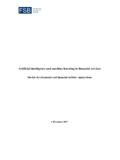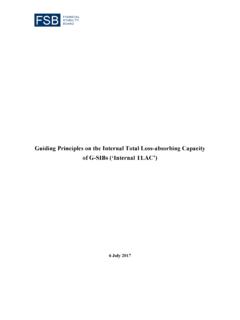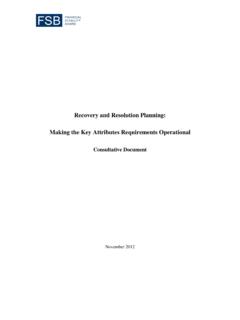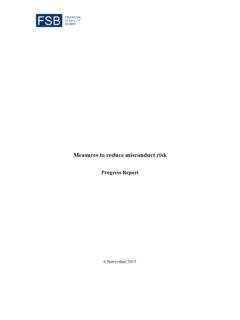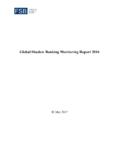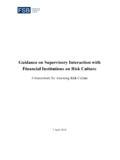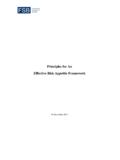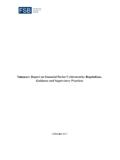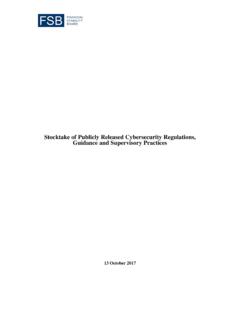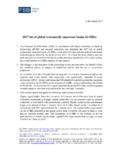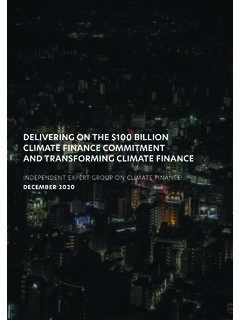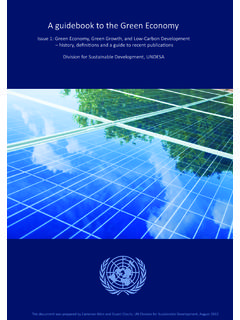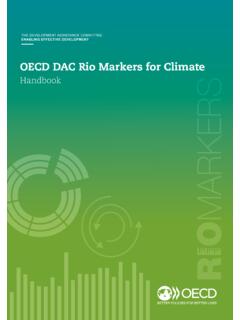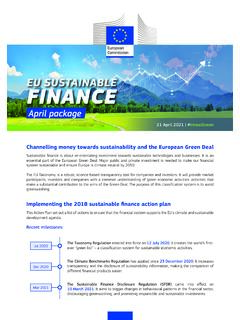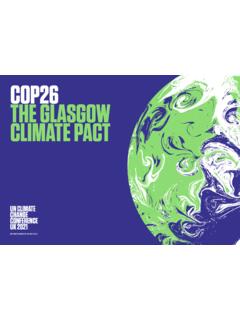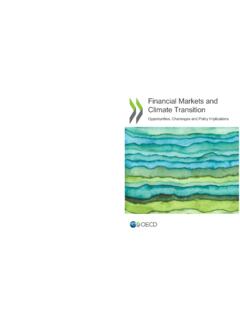Transcription of FSB Roadmap for Addressing Climate-Related Financial Risks
1 FSB Roadmap for Addressing Climate-Related Financial Risks 7 July 2021 The Financial Stability Board (FSB) coordinates at the international level the work of national Financial authorities and international standard-setting bodies in order to develop and promote the implementation of effective regulatory, supervisory and other Financial sector policies. Its mandate is set out in the FSB Charter, which governs the policymaking and related activities of the FSB. These activities, including any decisions reached in their context, shall not be binding or give rise to any legal rights or obligations.
2 Contact the Financial Stability Board Sign up for e-mail alerts: Follow the FSB on Twitter: @FinStbBoard E-mail the FSB at: Copyright 2021 Financial Stability Board. Please refer to the terms and conditions iii Table of Contents 1. Motivation and objective for the Roadmap .. 1 2. Areas of focus, goals and actions .. 2 Disclosures .. 3 Data .. 5 Vulnerabilities analysis .. 6 Regulatory and supervisory practices and tools .. 7 Interconnections between the areas .. 8 3. Taking forward the Roadmap .. 9 Block 1 Disclosures .. 12 Block 2 Data .. 19 Block 3 Vulnerabilities analysis.
3 22 Block 4 Supervisory and regulatory practices .. 26 iv 1 1. Motivation and objective for the Roadmap There is a growing focus on potential Risks to Financial stability from climate change. A manifestation of physical Risks as well as a disorderly transition to a low-carbon economy could have destabilising effects on the Financial system, including through a rise in risk premia and falling asset prices in the relatively short term. Climate-Related Risks may be amplified by the Financial system, across borders and across sectors. Climate-Related Risks are far-reaching and differ from other Risks to Financial stability.
4 They are global in nature, and will have effects across all entities, sectors and economies, but the effects will differ depending on their locations and activities. Climate-Related Risks may be highly non-linear, and their effects on the Financial system subject to substantial uncertainty and tail-risk. But it is foreseeable that some combination of physical and transition effects will occur. The effects are spread over long time horizons, and actions today may determine the severity of Risks in the years ahead. The breadth of Climate-Related Risks including their possible simultaneous crystallisation across multiple jurisdictions and sectors also has implications for the resilience of the Financial system.
5 The actions needed are therefore both bottom-up and top-down, to address Risks to individual entities and those to the system as a whole. A large, and growing, number of international initiatives are underway on Addressing Financial Risks from climate change. Ongoing work by official sector bodies, including the FSB, NGFS, BCBS, CPMI, IAIS, IOSCO, OECD, IMF and World Bank, and a variety of private sector bodies on climate issues have been added to recently by the IFRS Foundation proposal to establish an International Sustainability Standards Board (ISSB), initially focused on Climate-Related reporting.
6 More generally, climate topics are being given an important place in both the G20 and G7 agendas for 2021, and preparations are underway for COP26. The management of Climate-Related Financial Risks at the level of individual firms and at the level of the overall system are closely interrelated. Effective risk management at the level of individual companies and Financial market participants is a precondition for a resilient Financial system. The ability to manage Risks depends on reliable data, from a variety of sources, including from scientific and official sector sources and also from corporate disclosures.
7 High-quality corporate disclosures enable market participants to make better informed decisions, such as on pricing and allocation of capital, and they help Financial authorities to better assess the resilience of Financial institutions and the overall Financial system to Climate-Related Risks . By the same token, understanding the resilience of the Financial system to these Risks can support effective management by firms of Climate-Related Risks through Financial markets, the stable provision of sustainable finance , and an orderly transition to a low-carbon economy. Hence, micro-prudential, macro-prudential and economic objectives are closely intertwined.
8 The measures taken with the direct objective of Addressing Climate-Related Financial Risks will also put the Financial system on a sound basis for meeting these wider objectives. These interconnections between Climate-Related Financial Risks faced by different participants in the Financial system reinforce the case for coordinated action. The FSB, with its diverse 2 membership -- including Financial authorities from individual jurisdictions (ministries of finance , central banks, banking and insurance supervisors, securities market regulators), standard-setting bodies and international organisations -- and the NGFS as regular participant in FSB meetings, makes it well placed to coordinate the work to address Climate-Related Financial Risks .
9 This FSB Roadmap for Addressing Climate-Related Financial Risks , which has been prepared in consultation with standard-setting bodies (SSBs) and other relevant international bodies, supports international coordination in several ways. It promotes relevant initiatives at standard-setting bodies, the NGFS and other international organisations. By presenting relevant ongoing and planned international work in one place, it helps to identify gaps to be covered by further work, limit overlap and promote synergies. It sketches out how the FSB can serve as a forum for discussing cross-sectoral and systemic issues and agreeing a way forward.
10 And it provides input into broader international policy considerations by facilitating communication with the G20, G7 and COP26. All this supports the consistency of actions to be taken over the coming years, enhances authorities ability to address Financial stability Risks and reduces the risk of harmful market fragmentation. The FSB Roadmap sets out for G20 endorsement the Roadmap , as a comprehensive and coordinated plan for Addressing Climate-Related Financial Risks , including steps and indicative timeframes needed to do so, and paves the way for implementation.
